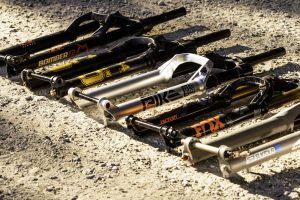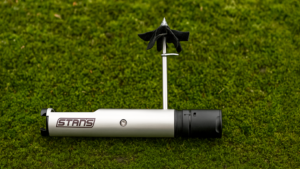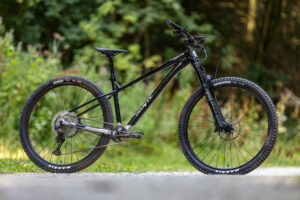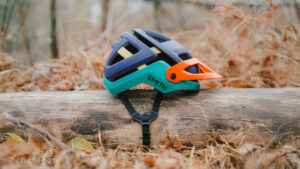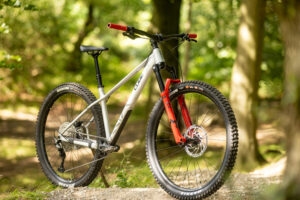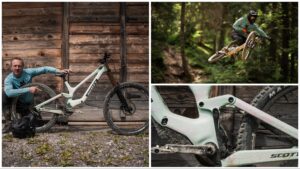Crosses the finish line first because it’s the fastest bike. Simple.
Trek Procaliber 9.7 review
Editor’s Choice 2020
Since the dawn of mountain biking, engineers and enthusiasts have been trying to make the humble hardtail more compliant. We’ve had suspension seatposts, soft-tails, flex stay, curved stays, mono-stays and box stays. You name it, someone has tried it. No approach however, has been as effective as Trek’s IsoSpeed decoupler; first developed on its road bikes designed to race across the gruelling cobbles of Paris Roubaix.
And while the execution of the design is complex, like all good ideas, the concept is elegant in its simplicity. By decoupling the seat tube from the top tube, Trek is able to let the seat tube flex more easily, which in turn transmits less vibrabration to the rider. Or, to think about it another way, the seat stays run into the top-tube, instead of the back of the back seat tube.
Whatever way you slice it, Trek’s IsoSpeed decoupler offers a noticeably smoother ride when seated. So even though the Procaliber 9.7 isn’t one of the new breed of progressive XC hardtails with slacker geometry, we were still able to ride it faster with less fatigue than any other XC hardtail in test. It’s incredible turn of speed enhanced further by the Bontrager Kovee Elite carbon rims. They also tipped the balance of the scales in Trek’s favour too, as the Procaliber 9.7 was also the lightest bike in our XC hardtail test.

The Trek Procaliber 9.7 crossed our finish line first because it’s the fastest bike on test. And in XC racing, that’s all that counts.
>>> MBR Trail Bike of the Year 2020
Modern XC race hardtails aren’t just designed to be ruthlessly efficient on the climbs. The best composite frames also use custom carbon layering, unique fibre alignments and sculpted tube profiles to engineer in compliance. And while the Procaliber 9.7 incorporates all of the above, Trek takes it one step further with its IsoSpeed technology.
Trek Procaliber 9.7 review
First designed to improve the comfort of its road bikes, IsoSpeed decouples the seat tube from the top tube, which in turn allows the seat tube to flex more easily and transmit less trail buzz to the rider. The simple idea being, less systemic rider fatigue leaves more energy for turning pedals. Sounds great in theory, right? Well, the good news is, it’s even better in practice.
Yes, the extra tech involved in IsoSpeed adds a few grams to the frame weight, but Trek has still managed to produce the lightest bike in the test, even if it’s only 110g lighter than its closest rival, the Mondraker Chrono Carbon R. Most of the savings are rotational weight – the carbon Bontrager Kovee Elite wheels guaranteeing that the Trek is lightning fast off the start line.

IsoSpeed decoupler is a game-changer
In fact we were so surprised to see carbon hoops on the Procaliber 9.7, we actually double-checked that Trek hadn’t sent a more expensive model by mistake. As it turns out it couldn’t have, even if it had wanted to, as the Procaliber 9.7 at is actually the most expensive XC hardtail that Trek offers in the UK.

RockShox reba fork is responsive but also offers decent support
Suspension
In the RockShox hierarchy, the 100mm-travel Reba on the Trek sits below the SID on the Mondraker but above the Judy on the Specialized Epic HT. It strikes a great balance in terms of performance too. On high-speed chatter it’s more forgiving on your hands than the SID, but it still offers more support for cornering and cranking hard than the Judy.
And if you really want to tighten up the response of the suspension fork for a spot of black-top blasting, the RockShox under-bar remote lockout is always within easy reach. It feels plastic-y compared to the remote on the Scott Scale 920, but thanks to the super-light cable action it’s effortless in use. And, because the release lever sits proud of the lockout lever, you always open up the fork when you reach for it in a moment of panic.

Silicone grips save weight as well as your hands
Components
Have we mentioned the Trek’s lightweight carbon wheels? Well, we should also highlight that they were the only wheels in the test to come set up tubeless. All you have to do is add sealant, which Trek kindly provides.
The contact points on the Procaliber are sorted too, and we particularly liked the ESI Chunky silicone grips. Granted the 12-Speed Eagle drivetrain with its 11-50t cassette doesn’t give you as wide a gear range as the Scott, but the SRAM XG-1230 cassette still offers a marked improvement in shifting performance over the Specialized.

Performance
When we first set eyes on the Trek, it wasn’t love at first sight. If anything, we thought the size large bike looked a little ungainly with its inverted 95mm stem and taller top tube. We even went as far as to peg it ‘the roadie’s mountain bike’.
Then we rode it. From the first pedal stroke the Procaliber took the lead in this test and never faltered. We were instantly won over by its effortless turn of speed, in part thanks to the carbon wheels, but it’s also about the more forgiving ride quality of the frame. Bumps just didn’t chip away at our speed as much as they did on the other bikes on test. And even when we were out of the saddle, the Procaliber was still the smoothest bike here. So much so, that the real limiting factor on rougher more technical terrain is saddle height. So while the weight savings of the OCLV carbon seatpost aren’t to be sniffed at, we’d swap it for a short-travel dropper in a heartbeat.

Stablemates
Trek Procaliber 6, £1,400
This is the entry-level bike in the Procaliber range. It gets an Alpha Platinum aluminium frame rather than carbon, but it still sports the IsoSpeed design that decouples the top tube from the seat tube to offer a smoother, faster ride. The geometry and sizing also mirror our test winner, so handing should be on point too.
Trek Supercaliber 9.7, £4,000
If you want the look of a hardtail but an even more forgiving ride than the Procaliber 9.7, how about the new Supercaliber? With its IsoStrut design delivering 60mm of travel, it could well be the perfect balance between hardtail efficiency and weight saving, with full-suspension comfort and control.
What’s new for 2021?
Depending on personal preference and course conditions, Trek wanted to make it easier for riders or races to swap between the Procaliber hardtail and the Supercalibrer suspension bike. So for 2021 the sizing and geometry of the Procaliber has been brought inline with the 60mm travel Supercaliber. The end result is that the Procaliber gets a half a degree slacker head angle for improved steering stability. The reach measurement has also increased by 10mm, while the stem shortens by the same amount so the fit remains the same. All positive changes, that should guarantee the 2021 Procaliber retains its winning performance.








